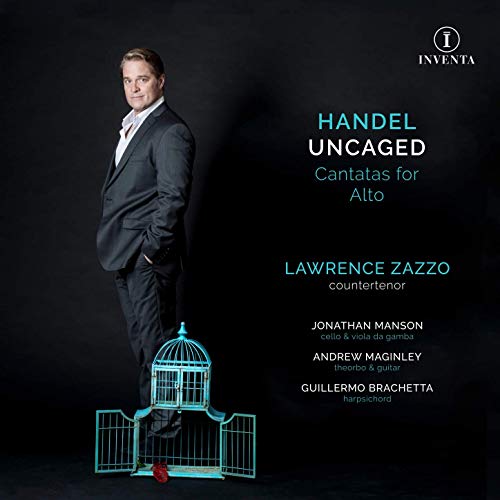Handel Uncaged: Cantatas for Alto
View record and artist detailsRecord and Artist Details
Genre:
Vocal
Label: Inventa
Magazine Review Date: 01/2020
Media Format: CD or Download
Media Runtime: 74
Mastering:
DDD
Catalogue Number: INV1002

Tracks:
| Composition | Artist Credit |
|---|---|
| Udite il mio consiglio |
George Frideric Handel, Composer
Andrew Maginley, Theorbo Guillermo Brachetta, Harpsichord Jonathan Manson, Cello Lawrence Zazzo, Countertenor |
| Stanco di più soffrire |
George Frideric Handel, Composer
Andrew Maginley, Theorbo Guillermo Brachetta, Harpsichord Jonathan Manson, Cello Lawrence Zazzo, Countertenor |
| Figli del mesto cor |
George Frideric Handel, Composer
Andrew Maginley, Theorbo Guillermo Brachetta, Harpsichord Jonathan Manson, Cello Lawrence Zazzo, Countertenor |
| Amore Uccellatore |
George Frideric Handel, Composer
Andrew Maginley, Theorbo Guillermo Brachetta, Harpsichord Jonathan Manson, Cello Lawrence Zazzo, Countertenor |
Author: Alexandra Coghlan
Part recital and part musical detective drama, ‘Handel Uncaged’ is, ironically, entirely captivating. At its centre is a premiere Handel recording that is both new and familiar – a cantata-cycle that shifts our perspective not just on the work itself but on the cantata as a genre.
Puzzled by the incoherent narrative and abrupt ending of Handel’s cantata Vedendo amor, HWV175, the countertenor Lawrence Zazzo was directed by scholar John Roberts to the Fitzwilliam manuscript that includes the piece as just one section in a five-part cantata-sequence, Amore uccellatore, which also includes Venne voglia, HWV176. Featuring an unprecedented 10 arias and lasting over half an hour, the first-person sequence (whose authorship was formerly in doubt) tells the story of a lover repeatedly trapped by ‘birdcatcher’ Cupid and his flock of seductive women.
Questions of how the sequence might originally have been performed are discussed in Zazzo’s extensive booklet note; but the issues are resolved here through the interpolation of instrumental movements by Handel between sections to smooth any awkward harmonic joins. Zazzo himself makes an engaging narrator, taking us seamlessly from the playful opening ‘Venne voglia’, through the colourful, lively storytelling of ‘Vedendo amor’ through to the more melancholy conclusion (the narrator’s ‘tail’ is lost, rendering him of no interest to lusty Cupid).
Zazzo, skilfully supported by Jonathan Manson (cello and gamba), Andrew Maginley (theorbo, guitar) and Guillermo Brachetta (harpsichord), sounds fresher than ever here in music that celebrates his feathery softness and roundness of tone. There’s no strain and not a sharp edge in sight in this pastoral sequence, whose highlights include the lovely ‘Camminando lei pian piano’ (a near relation of Cesare’s ‘Va tacito’) and ‘Trupz ci ci’, with its vivid imitation of birdsong. If there’s a lack of blade to climactic moments of anger or bitterness, it’s perhaps only appropriate to this pastel-coloured musical fantasy world.
Instrumental interludes taken from Handel’s sonatas and suites offer necessary textural contrast (the percussive crunch of Brachetta’s harpsichord is particularly welcome), helping to amplify the scope of a cantata that, if it’s not knocking on the door of full-scale opera, certainly makes its case here as a diverting solo serenata.
Discover the world's largest classical music catalogue with Presto Music.

Gramophone Digital Club
- Digital Edition
- Digital Archive
- Reviews Database
- Full website access
From £8.75 / month
Subscribe
Gramophone Full Club
- Print Edition
- Digital Edition
- Digital Archive
- Reviews Database
- Full website access
From £11.00 / month
Subscribe
If you are a library, university or other organisation that would be interested in an institutional subscription to Gramophone please click here for further information.




